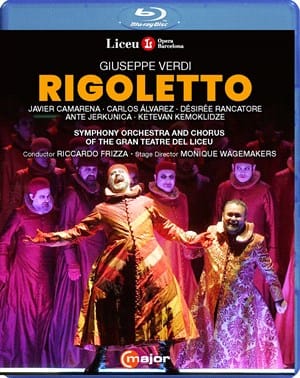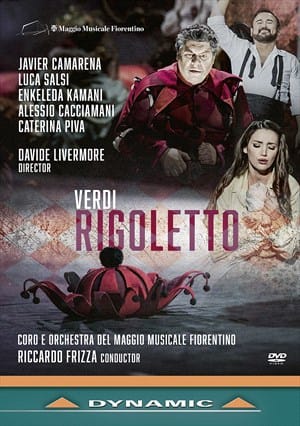Verdi's Rigoletto: a brace of Javier Camarenas!
Powerful stuff, beyond doubt. Which would I chose? I think it has to be the Florence production

Interestingly enough, in both of these DVD/Bluray performances of Rigoletto, it is the Duke of Mantua who is listed first, and they are the same: Javier Camarena. They also share the same conductor, Riccardo Frizza. But we have two Rigoletto's (Rigoletti?), and they are two great singers: Luca Salsi in Florence (2021) and Carlos Àlvarez in Barcelona in 2017 (the first time this popular piece had been done there for some dozen years!).

Monique Wagemakers' production in Barcelona was originally for Dutch National Opera (2004); it was then presented at Teatro Real, Madrid, in 2009. It is Minimalist in extremis: an illuminated box (a stylised platform) which is used for multiple functions, indlucinf split-level; a staircase (to Heaven?) to the right; and that's about it. The rest is lighting, and the interaction of colours, both via illumination and costumes (Sandy Powell). It is a miracle of modern direction - some will surely find it repulsive, but for me it works so well in concentrating the audience's attention on the characters and their interactions, not least at Gilda's death. There is nothing superfluous, Mantua it might be nominally, but these emotions are universal ... the chorus is almost a Greek chorus, dressed in reds and golds (Venetian colours - the opera was premiered in Venice on March 11, 1851).
There is great singing here. Carlos Álvarez is a fine, strong Rigoletto, Ante Jerkunica a strong Sparafucile with the odd caveat, and Katevan Kemoklidze a stunning Maddelena, Carlos Álvarez a strong Duke (better in his upper register than his lower, though). Oh, and Gilda? The weak link, alas: Désirée Rancatore seems uncomfortable, not fully inside the role, not always vocally secure. And yet the great quartet (“Bella figlia d’amore”) still works brilliantly, with the two couples split spatially:
.. and here's Camarena's “La donna è mobile”"
If Ante Jerkunica's Sparafucile is a tad over-vibrato-ed, it still carries both power and menace, and Ketevan Aemoklidze is an astonishing Maddalena, absolutely commanding the stage.
Here, finally, is Camarena's “Parmi veder ... Possente amor”:
So, perhaps Desirée Rancatore is not the finest of Gildas (in the Barcelona run, she was sharing the part with Maria José Moreno); but this is a Rigoletto not to be without; the production works so well.

Luca Salsi impressed beyond measure as Rigoletto at Covent Garden in February 2022 in a Rigoletto stunningly conducted by Stefano Molinari, and seen in Oliver Mears' production (see my review); he is no less impressive here, as powerful dramatically as he is vocally.
This is a more traditional staging in comparison to the above, at least (by Davide Livermore), but it remains relocated - to an upmarket night club. Here's the trailer:
With Camarena again as the Duke, an excellent Madellena in Caterina Piva, a fine Sparafucile in Alessio Cacciamani, this is a well cast Rigoletto. Finest of all through is the Gilda, Enkeleda Kamani, superb in all respects.
It's worthwhile looking in some detail, zeroing in one one act, as to how Livermore's production works:
In contrast to Barcelona, Florence's act 3 is set in a seedy night club, covidly-masked singers adding to the unsettling effect - is there a BDSM element here, perhaps? The set is all dark reds and blacks; any white seems an intruder. Hedonism is everywhere, from the massive painting of a pair of lipsticked-lips to the blowjob the Duke receives while initiating the famous quartet, “Bella figlia d'amore (Rigoletto shields the conservatively-dressed Gilda's eyes from the latter). Musically, that quartet is one of the great moments. Here in Florence, the participants are seen in pairs, while decadence continues in the background; Maddelena is dressed the polar opposite of Gilda, all in black against Gilda's virginal white and pink.Less striking than Florence's Miminalist lines, perhaps, but it works.
The storm takes place through a window via projection. There is tremendous power in Frizza's conducting here - he can be very forward-moving, sometimes too much so, but this benefits the scene beyond measure. The harrowing final scene finds Sparafucile bringing in "The Duke's" body in a black bin bag - putting out the body with the trash, as it were. A train passes behind the stage as Rigoletto hears the Dueke singing, leaving him alone, so alone, with the black bag. All congratulations to Fizza for the orchestral cry after the revelation - so potent and so together. Then comes the coup de théâtre: Gilda's 'dying' words are here post-mortem - she sings them, bloodied, to the side and behind Rigoletto, while he cradles a body replica of Gilda. She sheds some clothes to reveal an angelic white slip - but with a blood stain at the heart centre. A projection of flames, towards which Gilda walks in silhouette, illuminates the back of the stage.
Powerful stuff, beyond doubt. Which would I chose? I think it has to be the Florence production - if there was a finer Gilda in Barcelona, the result might have been different, especially as of the two productions, it is Wagemakers' that, for me at least, illuminates Verdi's immortal score the most.
Incidentally there seems to be an Amazon error re the Liceu DVD: the Blu-ray link below is correct but if you click on the DVD listing from that page, you get a completely different Rigoletto .... there is an alternative listing, which I include below.




